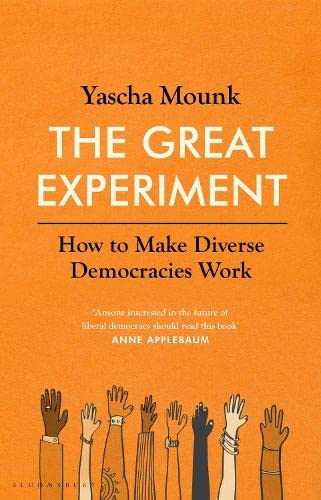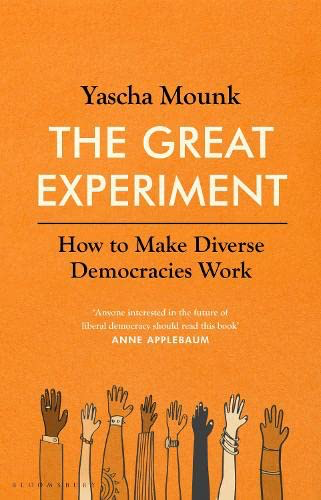Yascha Mounk, The Great Experiment: How To Make Diverse Democracies Work


Yascha Mounk, The Great Experiment: Why Diverse Democracies Fall Apart and How They Can Endure (Routledge, 2021)
Yascha Mounk has made his name writing and speaking about democracy, populism, threats to liberalism and the like over much of the past decade. I quite enjoyed his 2018 book, The People vs. Democracy, largely because of its stress on the ways in which different countries can suffer from two separate but related political deficits: democracy without (classic) liberal rights protections, and liberalism without sufficient democratic mechanisms. An entirely despotic regime might guarantee freedoms of speech, association, conscience, press, guns, and even a bunch of rights nobody has ever considered, while an extremely democratic jurisdiction can lack many of those rights (though I would argue not as many as is often claimed by those who fret most about “illiberal democracies” and the “tyranny of the majority” (see my paper on this).
A careful distinction between the use of democratic methods to determine public policy and the guarantee of a broad list of inalienable individual liberties is cardinal to any coherent discussion of political philosophy. Unfortunately, it is sometimes not fully grasped by those who write on these topics. As Mounk had made a particular point of this matter in his earlier work, I was surprised to see him mangle the subject in his new book, The Great Experiment. He now seems to think that most of the cure for well-known democratic deficiencies can be found in the generous supply of additional liberalism.
The “great experiment” Mounk is talking about is the attempt around the world, beginning sometime after World War II, to introduce democratic (and harmonious) multi-ethnic, multi-racial, multi-religion or multilingual societies. The “and harmonious” is nestled in parentheses above because, of course, there’s nothing new about multi-ethnic, multi-racial, etc. countries–even allegedly democratic ones. In fact, some of these nations, like India, Canada, Brazil, the U.S. and the old Soviet Union are pretty expansive. The earlier attempts haven’t always managed to work out the problems of group discrimination/domination, regular internal hostilities, and other associated unpleasantries, though. So Mounk’s main interest is in promoting his ideas for governmental/societal forms that he believes will engender greater harmony, especially since he sees an inevitable and rapid increase in the number of diverse jurisdictions as a result of mass group exoduses and attempts to immigrate.
His book is artfully constructed, certainly as fun to read as any lengthy work in this field is likely to be, and this in spite of (because of?) his eagerness to itemize lots of horrible practices around the world both at present and throughout history. It isn’t always clear what moral we are expected to take other than disgust when, e.g., an aggrieved batch of Hindu brothers brutally murders a Muslim suiter for the hand of their sister by repeatedly running over the fellow with their car. But there’s no doubt that these stories make the book less traditionally academic: in style, it’s more like something usually found on the self-help shelves. This can result in Mounk coming off as bit careless or unfeeling, as when he says that Afrikaners should be seen as having had a fair democracy going–so long as one ignores the fact that only whites were enfranchised, or when he sometimes forgets to mention that women had no vote in the U.S. even after the Emancipation Proclamation. But as the book is generally thoughtful and Mounk’s scholarship quite broad, I think charity demands attributing such oversights to too-swift publication. My sense is that the book should be credited as being an engagingly written popular summarization of some of the most serious problems facing contemporary attempts at achieving world peace.
Disdaining both the popular “melting pot” and “salad bowl” (or “mosaic”) visions for how diverse populations can successfully integrate, Mounk pushes a “public park” metaphor. Such places, he tells us, “are open to everyone,” “give their visitors options,” and “create a vibrant space for encounter.” The idea is that one should neither attempt to dissolve the essential differences and create vanilla (if bellicose) nationalists, as Theodore Roosevelt wanted, nor let the lettuce stubbornly insist on being nothing but lettuce and the tomatoes stick at unadulterated tomatohood so long as the twain manage to taste good in one bowl. Without explicitly saying so, Mounk seems to suggest that the melting pot is a right-wing and the mosaic a left-wing solution to the problems facing diverse communities. It is at least clear that on his view, the populist right wants “newcomers” to be forced to simply discard what have formerly seemed to them essential components of their lives, while the progressive left is largely focused on the glorification of such differences by obsessing on “identity politics.” With those sorts of caricatures claimed by some critics to fuel much of the book’s narrative, and with Mounk’s mostly sermonistic solutions (“Don’t Ridicule or Vilify; Engage and Persuade”), I suppose it is unsurprising that some of the notices the work has received have been particularly harsh. Ian Beacock called the book “pious and relentlessly superficial”: that’s a clever line no doubt, but I don’t think the work is quite deserving of such hostility.
Again though, the ferocity is unsurprising. Remember, over the course of at least a single generation, the Stalin-era Communist Party made its unsuccessful attempt to melt away all ethnic, religious, linguistic, and other important differences by engaging in such practices as burning down churches and taking kids away from their parents so the babies could be fed only appropriate class values (and only in the Russian language). And for his part, the pre-Mecca Malcolm X offered an entirely separatist, identity-centered solution that he believed ought to be achieved as soon as possible by any means necessary. Which of those programmes should be characterized as leftist, and which rightist, may be a matter of some controversy, but it’s largely agreed that both plans portend really unpleasant times for a lot of people. If Mounk is actually insinuating (even under his breath) that those sorts of extremes share much with the positions being advanced by the (generally unnamed) scholars, pundits, and advocates with whom he disagrees, he shouldn’t be too surprised at the aggressiveness of the return volleys speeding toward his head. It is simply not the case that majoritarianism must end in Stalinism or that “wokeness” can only lead to violent separatism. In spite of their above-mentioned vehemence, several prior reviews of this book (e.g., this, this, this, and this) are illuminating–even quite deep–on the historical, psychological, and sociological potential (or lack thereof) of Mounk’s proposals, so I won’t spend much time discussing any of those matters.
For one thing, both my expertise and my interest in those areas are limited. For another, I won’t deny that I tend toward dark pessimism: I am someone who certainly deserves to be included in Mounk’s scorned “motley crew of cynics.” When I hear nearly any suggestion of something that is claimed to be the long-sought-for fountain whose waters can make acrimony dissipate and thus allow every group to suddenly join the same big chorus, serious doubts immediately rise in my chest. I hasten to add here that my own sense of hopelessness doesn’t take–or require–anything from the Charles Murray theory that certain ethnicities and races are simply incorrigibly bad. I rather think that it’s possible, even likely, for anyone who has read Tolstoy or pushed for land value taxes during the last half-century to have minimal confidence in any utopian theorizing. Mounk is young. But in the perhaps jaded view of this codger, the discovery of any political panacea is about as likely as my basketball or soccer skills are to suddenly impress everyone at one of the city parks Mounk is so fond of. In any event, whether as a result of ill-advised defeatism or because I have little to add to prior commentary, I will here mostly concentrate on the relations between classical liberalism and authentic democracy that, as mentioned in the opening paragraph,
I think Mounk muddles to a fare-thee-well. As various versions of majoritarian democracy and classical liberalism have both been around for quite a while now, the tensions between them are hardly unknown. Mounk disguises their long-lived coexistence problems by redefining “liberalism” to include several democratic principles. (He may also attempt to maneuver the debate by recasting “communitarianism” so it reflects only the views of a single named advocate, Chandran Kukathas, a thinker who may very well be seen as a straw man by numerous scholars on the left). Aside from making the protection of an array of individual rights essential to his version of liberalism, and suggesting that such protections ought to include a limited government with “checks and balances” and a strict “separation of powers,” Mounk sneaks into his definition a requirement of frequent free and fair elections. Those practices, however, really have nothing to do with classical liberalism–a matter his earlier book is clear on. Of course, what this accretion does for Mounk is allow him to distinguish his position from more typical libertarianism, a position which has historically shown no fondness for electoral government at all.
This trick isn’t quite as illegitimate as defining “liberalism” as a democratic society (on a hill) where everyone is happy, prosperous, and gets along swimmingly, but it’s in the same general neighborhood. It may be worth noting here that a number of classical liberals to Mounk’s right have similarly attempted to redefine terms to allow them to cast off any apparent lack of compassion for the unfortunate and replace it with a picture in which it is only really libertarians who can truly be “bleeding hearts.” Heck, it’s not just the allegedly “woke” folks who want to be loved. Mounk’s interweaving support for democracy with his beloved Millian liberalism is explicitly intended to address both the stubborn problems faced by perpetual minorities that never get any jurisdictional power in majoritarian systems and the brutalities suffered by nonconformists within inflexible, despotic groups. He argues these problems were actually exacerbated by Arend Lijphart’s successful advocacy of consociational power-sharing around the world. And I believe Mounk is right that neither Lijphart’s, nor anybody else’s prior proposals offer much promise on the utopia front. Federalism, consociationism, multi-cameralism, and separation of powers all manage to dilute majoritarian democracy without really doing much good in areas where there is both diversity and either intra- or extra-group conflicts.
The specific problem for Mounk is that additional liberalism–even when that concept is inflated almost beyond recognition by an inappropriate annexation of democratic principles–can’t do much better. It may seem that insisting on a bunch of inalienable rights will always prevent the sorts of cruelties that Mounk is most worried about. But aside from the fact that any such requirements may be absolutely opposed by this or that group (which may even consider their advancement the sign of a dangerous apostasy), lists of sanctified rights are almost never agreeably assented to even in comparatively liberal jurisdictions. Is having a third-term abortion a right or is a prenate’s capacity to be born inviolable? Can people walk (and perhaps urinate) wherever they want to or does a property owner have the right to prevent non-owners from stepping (or peeing) on her lawn? If property rights do prevail in such cases, can one buy all the potable water in some area and refuse to sell it? Can 11-year-olds get married or change their genders if they want to? Can people refuse to wear masks or be vaccinated during a pandemic? Classical liberalism has been unable to answer these questions in ways that satisfy very many parties.
Mounk says that “to be truly free, citizens of diverse democracies must know that they will not experience hostility or discrimination based on the color of their skin; that they can worship as they please; and that they are if they so wish, free to spend most of their lives within the ethnic or religious communities into which they were born.” In fact, he regularly repeats throughout the book that ties of race, religion, and ethnic culture have always been most important to most people. But, of course, even if that is true, it is an accident of human psychology: there is nothing inherent in liberal philosophy that requires that more unusual (i.e., non-religious or ethnically derived) individual desires be downplayed in favor of the more common ones. Suppose someone is simply devoted to nudism or screaming at the top of one’s lungs in grocery stores. Maybe those moral concerns or behavioral practices stem from a sincere atheism rather than a popular religion. How can liberalism sniff at those desires, regardless of their intensity? Should prospective employers be prohibited from discriminating against eliminative materialists as well as Muslims? The elevation that Mounk wants to provide here for the more popular commitments is pragmatic and based on what may well be solid empirical findings. But while it likely makes good sense to take that evidence into account, the choice to do so has nothing whatever to do with liberalism.
It is the same for Mounk’s exaltation of hot dogs, baseball, and Grandma Moses over blood or style of constitution and legislature when he searches for the best possible bases for patriotism. (A) Such exaltation is entirely unrelated to the quotient of liberalism one wants to invest in; and (B) it seems unlikely to this (motley crew) pessimist that even Nathan’s slathered with French’s and relish will do the trick. Look, I don’t fault Mounk for not being able to find his way out of the three-dimensional corn mazes of democratic theory: I doubt anybody can. But I am uncomfortable with the suggestion that such low-sugar porridge as he presents has any real chance of providing substantial nourishment. Given the near-immutability of human nature–including the aspect that Mounk calls its “groupishness,” it seems to me quite likely that there really is no path out of the morass so aptly described in his book. I join him in wanting to see many more pacific democracies around the globe, but liberalism can’t guarantee that any more than communitarianism can.
My own view is that all sincere democrats can coherently plump for are guarantees of equal protection/non-discrimination and an insistence upon the strictly political rights necessary for fair democracy to flourish. But when I say this I don’t deny that these would be insufficient to put a stop to all of the many horrors Mounk specifies so grippingly in his book. I believe that we can mitigate SOME of the remaining dangers by tinkering with democratic mechanisms–e.g., providing for proportional representation and the ability to recall all public officials–but I don’t think all the serious ailments can be entirely obliterated, either by hook, crook, or book. They seem rather to be ineliminable constituents of the human condition.

About the Author
Walter Horn is a philosopher of politics and epistemology.
His 3:16 interview is here.Other Hornbook of Democracy Book Reviews